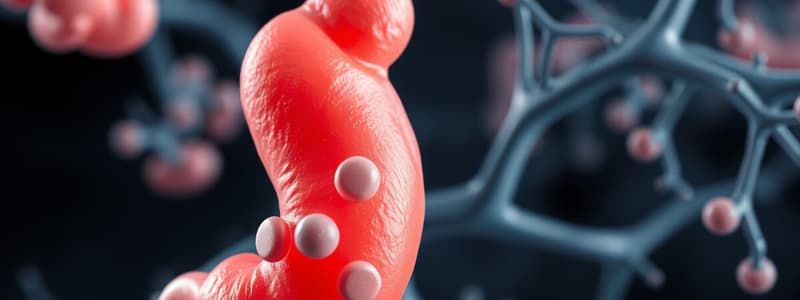Podcast
Questions and Answers
What is the function of the pancreas?
What is the function of the pancreas?
The pancreas is both an exocrine gland that secretes digestive enzymes and an endocrine gland that secretes hormones like insulin and glucagon.
What are the two main hormones produced by the pancreas?
What are the two main hormones produced by the pancreas?
Insulin and glucagon.
Type 1 diabetes was previously called ______.
Type 1 diabetes was previously called ______.
insulin-dependent diabetes mellitus
The current key diagnostic criterion for diabetes is hyperglycemia with a fasting plasma glucose level higher than ______ mg/dL.
The current key diagnostic criterion for diabetes is hyperglycemia with a fasting plasma glucose level higher than ______ mg/dL.
Signup and view all the answers
What is a common symptom of diabetes mellitus?
What is a common symptom of diabetes mellitus?
Signup and view all the answers
Type 2 diabetes accounts for at least 90% of all cases of diabetes mellitus.
Type 2 diabetes accounts for at least 90% of all cases of diabetes mellitus.
Signup and view all the answers
What complication can result from high blood glucose levels in type 1 diabetes?
What complication can result from high blood glucose levels in type 1 diabetes?
Signup and view all the answers
Which type of diabetes is characterized by a lack of insulin production?
Which type of diabetes is characterized by a lack of insulin production?
Signup and view all the answers
What is the goal for blood pressure in patients with diabetes?
What is the goal for blood pressure in patients with diabetes?
Signup and view all the answers
Study Notes
Pancreas
- Dual function as an exocrine gland (digestive enzymes) and endocrine gland (hormones).
- Produces key hormones: insulin (lowers blood glucose) and glucagon (raises blood glucose).
- Insulin promotes glucose uptake and storage as glycogen in the liver, while glucagon converts glycogen back to glucose when needed.
- Glucose serves as a primary energy source, stored as glycogen in the liver and muscle; excess stored as triglycerides in fat.
- Pancreatic or islet cell transplants may be considered for Type 1 diabetes patients unresponsive to other treatments.
- Insulin influences fat metabolism by stimulating lipogenesis and inhibiting lipolysis.
Pathophysiology of Diabetes Mellitus
- Diabetes mellitus is a carbohydrate metabolism disorder involving insulin deficiency, tissue resistance, or both.
- Two main types:
- Type 1 diabetes (10% of cases): characterized by minimal or no insulin production, requiring insulin therapy.
- Type 2 diabetes (90% of cases): involves insulin resistance and deficiency, generally not reliant on insulin therapy.
- Diagnostic criteria include hyperglycemia: fasting plasma glucose >126 mg/dL or A1C ≥6.5%.
- Common symptoms: elevated blood glucose, polyuria, polydipsia, polydipsia, weight loss, blurred vision, fatigue.
- Estimated Average Glucose (eAG) is a conversion of A1C to provide a clearer understanding of blood sugar levels for patients.
- Type 1 diabetes can lead to serious complications like diabetic ketoacidosis (DKA) due to insufficient insulin, leading to fatty acid breakdown and ketone production.
- Hyperosmolar nonketotic syndrome (HNKS) can also occur in extreme hyperglycemia, often precipitated by stress.
- Type 2 diabetes linked with conditions like obesity, coronary heart disease, dyslipidemia, hypertension; aims for blood pressure <130/80 mmHg and LDL <100 mg/dL.
Studying That Suits You
Use AI to generate personalized quizzes and flashcards to suit your learning preferences.
Description
Explore key concepts related to antidiabetic drugs with these flashcards from Chapter 32 of your pharmacology textbook. Learn about the pancreas, its functions, and the hormones involved in glucose regulation. Perfect for reviewing essential information for your upcoming exam.




